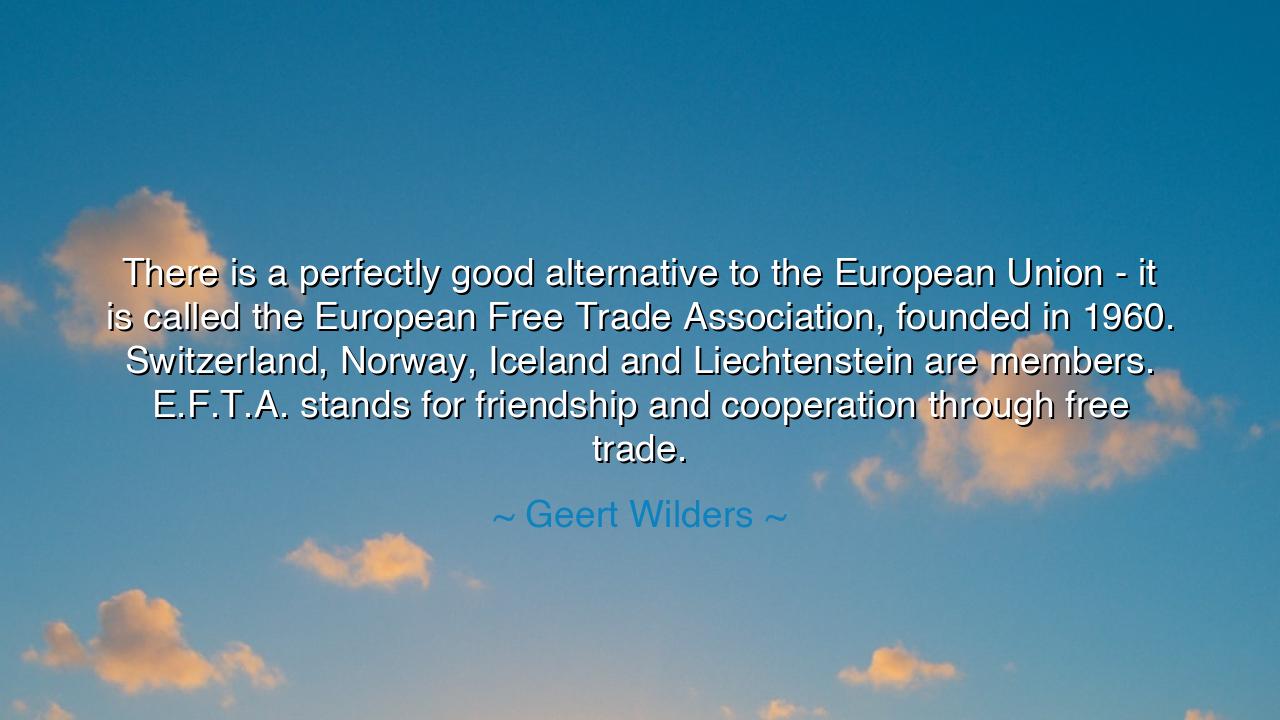
There is a perfectly good alternative to the European Union - it
There is a perfectly good alternative to the European Union - it is called the European Free Trade Association, founded in 1960. Switzerland, Norway, Iceland and Liechtenstein are members. E.F.T.A. stands for friendship and cooperation through free trade.






In the bold and resolute words of Geert Wilders, a voice of fierce conviction and independence, there lies a message not only of politics but of principle: “There is a perfectly good alternative to the European Union — it is called the European Free Trade Association, founded in 1960. Switzerland, Norway, Iceland and Liechtenstein are members. E.F.T.A. stands for friendship and cooperation through free trade.” Though born in the modern age, these words resound with the spirit of ancient nations and the wisdom of those who have long understood that true unity arises not from compulsion, but from mutual respect and freely chosen cooperation. Wilders speaks not merely of governance but of the timeless struggle between freedom and conformity, between alliances built on choice and empires sustained by control.
The origin of this quote lies in the ongoing debate over Europe’s political destiny — a debate between those who seek a centralized European identity through the European Union, and those who value the sovereignty of individual nations bound together by commerce and friendship rather than bureaucracy. Geert Wilders, a Dutch statesman known for his nationalism and defense of independence, points back to history — to the founding of the European Free Trade Association (E.F.T.A.) in 1960. At that time, Britain, Sweden, Denmark, Austria, and others sought an alternative path to cooperation, one founded not on the surrender of self-rule but on economic partnership and mutual benefit. For them, the principle was clear: nations may prosper together while remaining free to shape their own laws, cultures, and destinies.
To say that E.F.T.A. stands for friendship and cooperation through free trade is to remind us that true friendship cannot be imposed — it must be voluntary, born of goodwill and shared interest. The ancients knew this well. The Greek city-states of old, though proud and independent, formed the Delian League to defend themselves from a common threat. Yet even that alliance, when corrupted by domination, turned to tyranny under Athens. So it is with all unions that forget the sanctity of freedom. Wilders’s vision, like that of the founders of E.F.T.A., calls for a partnership rooted in equality — where nations meet not as masters and servants, but as brothers and sisters in commerce, each respecting the sovereignty of the other.
Consider the nation of Switzerland, a shining example of this principle. Though small in size, it stands as a fortress of independence amid the European continent. Choosing not to join the European Union, Switzerland remains bound to its neighbors through E.F.T.A., participating in trade and cooperation while retaining its self-determination. Its prosperity, stability, and neutrality prove that unity need not demand uniformity. Switzerland’s friendship with its neighbors is not enforced by treaties of subordination, but sustained by trust — the same trust that E.F.T.A. embodies. In this, we find the living truth of Wilders’s words: that freedom and friendship are not opposites but allies, that cooperation loses nothing when born from liberty.
Yet beneath this political message lies a deeper moral lesson — one that transcends nations and speaks to the heart of every human being. Friendship and cooperation through free trade are but reflections of the broader truth that harmony in life must come through choice, not coercion. Whether between peoples or individuals, unity built upon force will always falter. But unity built upon mutual respect, upon the exchange of gifts freely given — whether those gifts be goods, ideas, or goodwill — will endure. Just as trade among nations strengthens economies, the free exchange of kindness and understanding strengthens the soul.
Thus, Geert Wilders’s call is not only for political independence, but for the rebirth of an ancient virtue: freedom guided by friendship. He warns us that institutions grow corrupt when they forget that they exist to serve, not to rule. The greatness of a nation, like the greatness of a person, lies not in domination but in the ability to cooperate without surrendering integrity. A nation that stands firm in its identity, yet stretches out its hand in peace, embodies the noblest ideal of civilization.
And so, dear listener, take this teaching beyond the realm of politics. Let it speak to your relationships, your work, your way of life. Build bonds not upon fear or dependence, but upon trust and fairness. Engage with others as equals, and let every act of cooperation be an act of freedom. Whether you stand among nations or among friends, remember that true unity is not imposed — it is chosen, and its strength lies in the liberty of all who share it.
For as Geert Wilders reminds us, E.F.T.A. — and indeed all true friendship — “stands for friendship and cooperation through free trade.” In this simple truth lies a timeless principle: that prosperity, peace, and brotherhood are strongest not when forged by force, but when born from respect. Let every generation learn this lesson — that only in freedom can love endure, only in equality can cooperation flourish, and only in friendship freely given can humanity truly thrive.






AAdministratorAdministrator
Welcome, honored guests. Please leave a comment, we will respond soon